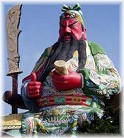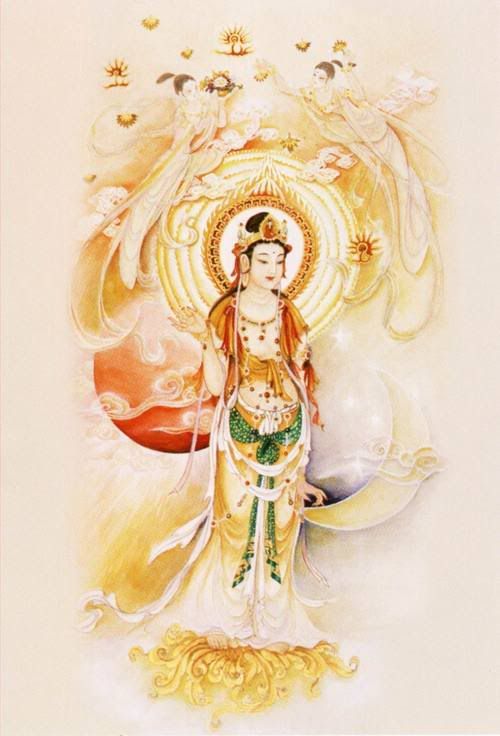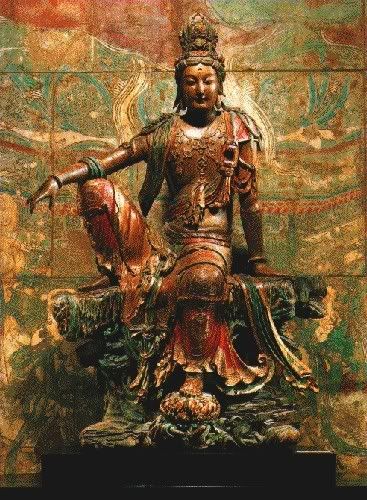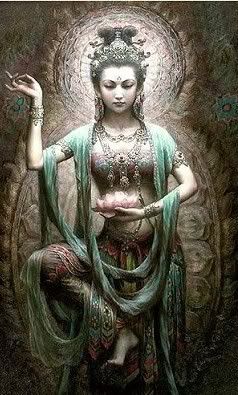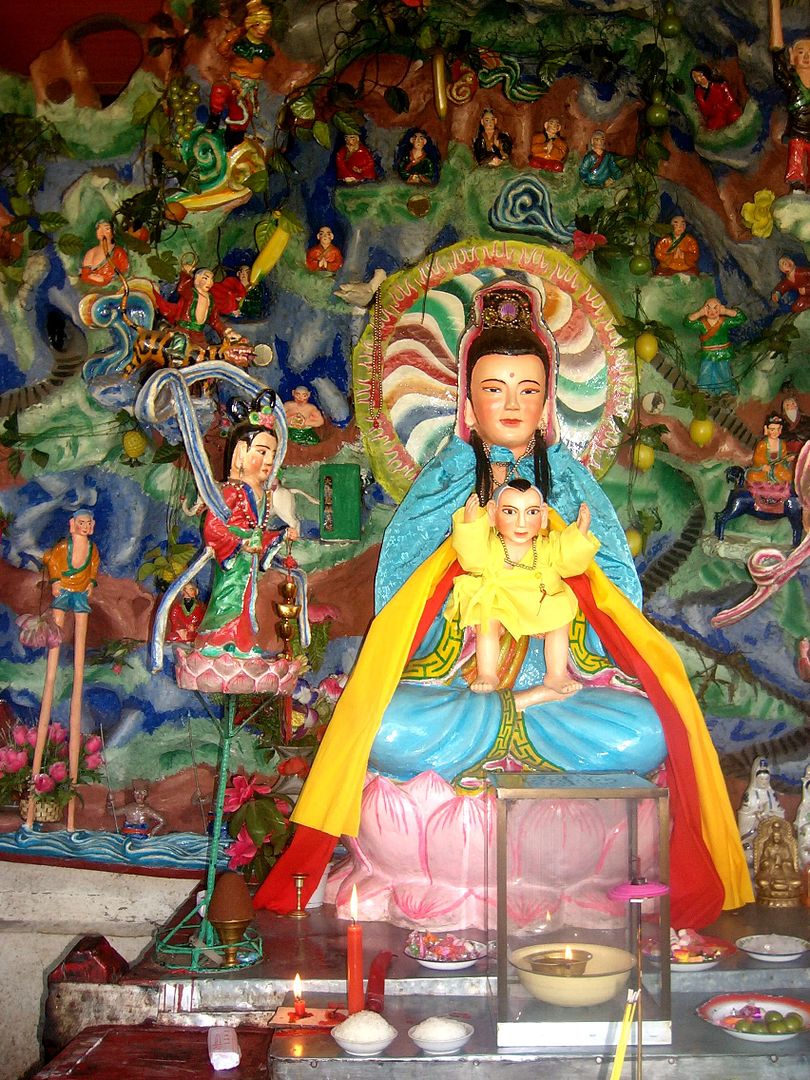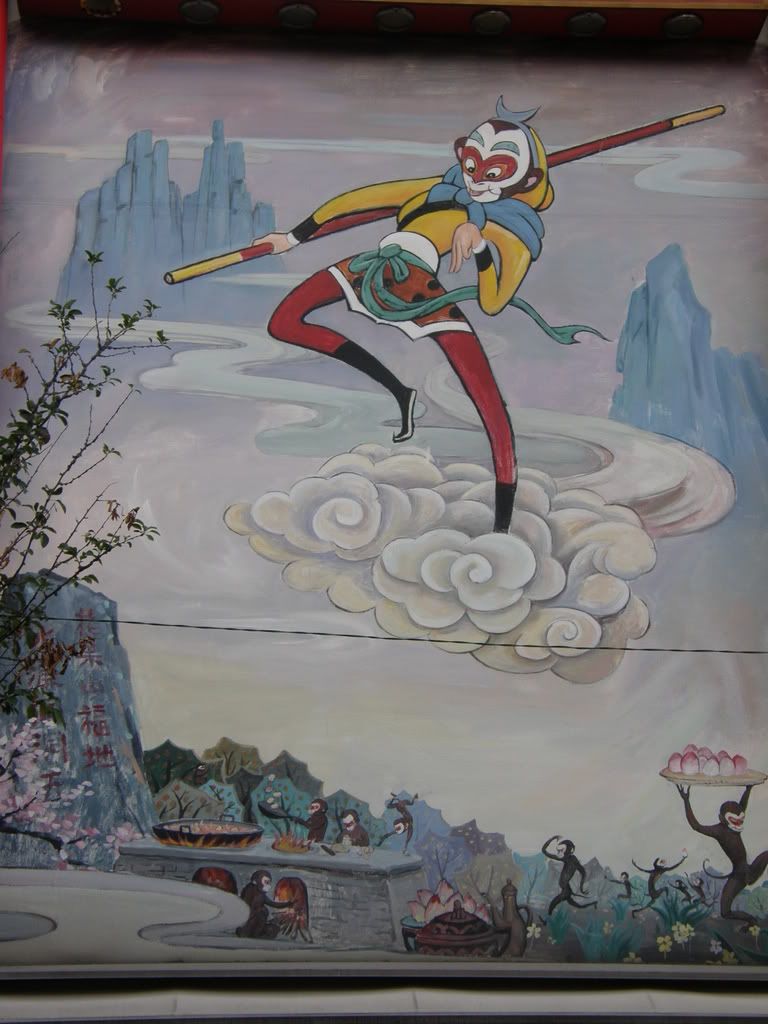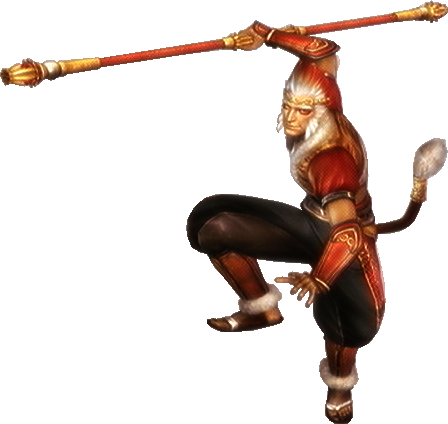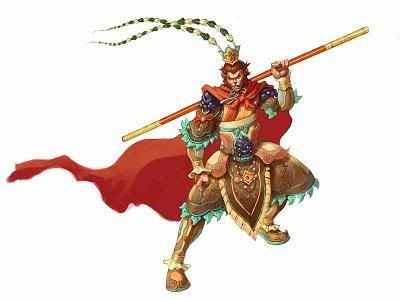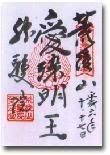The 5th lunar day of Chinese New Year is the Welcome Day for the God of Wealth. Many families worship the God of Wealth in the early morning. After the ceremony, people explode firecrackers to invite the God of Wealth to enter the house. That's why we can keep continuously hearing the sparsely sound of firecrackers in the morning.
Many stores open on this day after Chinese New Year holiday. Some religious store owners put a table in the front of company's main entry. They prepare fruit, flower, candy, tea, candles and animal sacrifices on the table to worship the God of Wealth. Some even invite the lion dance team to celebrate the opening ceremony. The mascot of the God of Wealth will appear and enter the store. The store owner will give the mascot a Red Envelope with money reward inside.
Who is the God of Wealth? The answer is more than one Gods of Wealth in the Chinese society. Some selected gods are from the novel of Feng-Shen Bang (The Bulletin Board of Delegated Gods), which is written in Ming Dynasty
(1368 to 1644 AD). The story of the Feng-Shen Bang is talking about the rise of Chou Dynasty
![]() (1045 BC to 256 BC). The characters are the historical figures mixing with religious gods, goddesses, devils, demons, immortals, fairy person and spirits from Chinese mythology.
(1045 BC to 256 BC). The characters are the historical figures mixing with religious gods, goddesses, devils, demons, immortals, fairy person and spirits from Chinese mythology.
The main character in the Feng-Shen Bang is Chiang Tze-Ya who was a student of Original Supreme God. Mr. Chiang studied to become immortal at age 32 and failed after 40 years later. He went back to his home town and had trouble to make a living as a restaurant owner, businessman, fortuneteller until the founder of Chou Dynasty asked him as the premier when he was 83. He was rewarded the state of Chi
after Chou dynasty conquered the Shang Dynasty
(1600 BC to. 1046 BC). He lived up to 139 year old, severed for four emperors of Chou Dynasties and had 13 children.
Chao Kung-Ming
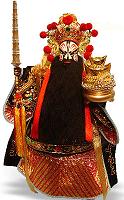 | The major God of Wealth is Chao Kung-Ming. Before the book of Feng-Shen Bang, Chao Kung-Ming had magic power and was in charge of wind, thunder and rain. Once he was also in charge of plague. That means he can save or take away people's lives. Later, he became a general of millions of ghosts. He had a black face, wore combat uniform with helmet, carried golden wheel and metal chain on the the back of a black tiger. depree In the Feng-Shen Bang, Chiang Tze-Ya Chao Kung-Ming wasn't entitled as the God of Wealth by Chiang Tze-Ya. But because of his position, Chao Kung-Ming became the God of Wealth in Chinese mind. People forgot about his ugly and fierce face and changed his image by adding golden treasure around him. Chao Kung-Ming was killed by the shooting arrows on this both eyes and heart. People said the God of Wealth is without eyes and heart, which means everyone has the chance to become millionaire from the blessing of the God of Wealth no matter you are rich or poor. Chao Kung-Ming was a gangster when he was young. He regret what he did in the late age. Once he took off his clothes and asked people to punish him by using firecrackers to bang his body on the Lantern Festival night. To injure himself is to atone the sin and to be responsible the coming disaster. The event of mass firecrackers is still held in the Lantern Festival night today. |
Kuan Yu
| The mst poupluar God of Wealth is Kuan Yu who was a general in Three Kingdom period, (2211-263 AD), after late Han Dynasty. His trademark is the red face, long beard, long whiskers, green battle uniform and 40-kilogram long broad blade weapon. He disguised himself with a red face because he killed a bad guy when young. He helped his friend and tried to restore the power of Han Dynasty. He won lots of battles and killed many enemy's generals. But he end with a beheaded general. After his death, his spirit wouldn't die and his divine image appeared on the sky several times. People remembered his brave and fighting skill, faith, righteousness, loyalty to friends, and act of justice. Chinese believe that his spirit can protect themselves and repel the bad luck. He was treated as the God of War before Ming Dynasty. After Ming Dynasty and Ching Dynasty, more business persons worship General Kuan, because they needs partners in business with righteous, trustful, loyally personality. Also, the business people would like to win the business deal all the time like a ever-win General Kuan. Therefore, Kuan Yu became the God of Wealth. Both Kuan Yu and Chao Kung-Ming are military officers. They are called The God of Sword Wealth. |
Bee Kan
Bee Kan was a smart and loyal officer in Yin ( Late Shang) Dynasty, He was also an uncle of the emperor. Chiang Tze-Ya left him a magic paper and told him to burn and eat it when he was in big emergency.
The emperor's lovely queen was a nine-tail fox transformed into a beautiful woman. Bee Kan killed many foxes related to the queen. The queen wanted to revenge and pretended very sick and told the emperor that she needed the hear of Bee Kan to recover her health. The emperor called Bee Kan into the palace and Bee Kan took out his heart and then walked away.
Bee Kan was without heart, but didn't die because he ate the Chiang Tze-Ya's magic paper before entering the palace. Bee Kan left the palace and donate money and treasure to many people. A person without heart must be fair to the money and business deal. Later Chiang Tze-Ya entitled Bee Kan as the God of Wealth in the Feng-Shen Bang.
Fan li
Fan Li helped the king of Yeuh to regain the state. He was out smarter than the king. He quitted his position and move the state of Chi to prevent to be killed later.
He changed his name in Chi country and made lots of money in business. The king of Chi found his talent and invited him as the premier. But Fan Li gave away all his money to people, then run away again. Fan Li chose another business town to started the new business again. Not too many years later, he became a millionaire again
Fan Li is a symbol of collection of money. He never treasure his money. He can give up the wealth, career, honor and prosperity. What he showed his wisdom and business management skill to people. That's why Fan Li was treated as the God of Wealth after his death.
Bee Kan and \fan Li ware smart statesman. They are called The God of Pen Wealth.
Yao Shaos
According to the Feng-Shen Bang, Mr. Yao had a position of Profit Growth Officers. He was a student of Chao Kung-Ming who was the God of Wealth. Chiang Tze-Ya entitled him Yao Shaos as the Auspicious God. Chinese treat him as the God of Windfall, because the business profit and lucky money from gift are easy money to make people rich faster.
The God of Windfall usually will appear besides the God of Wealth, because people like something extra and easy.
The God of Local Land
The God of Local Land is the lowest rank office in Taoism and very close to people. Many people fulfilled their wishes after they prayed and asked the God of Land for good luck. That's why there are many little roadside shines of the God of Land in the countryside. Therefore, for some people the God of Land is the God of Wealth to them.
Five Different Gods of Wealth
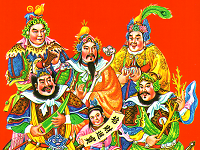 | The God of Wealth brings people money. Five Gods of Wealth must make people much richer. One said that Five Gods of Wealth were five friends who had same birthday and met in a temple. Because they came to the temple for the same purpose to pray for money luck, so they became very close friends. Later, all of them became rich because of successful business. Five of them donated money to build a new temple. They are entitled Five Gods of Wealth after death. The other popular saying that Five Gods of Wealth are Chao Kung-Ming with his four assistants who are in charge of receiving treasure, collecting jewelry, summoning money and raising profit. The picture on the left shows extra the Boy of Wealth. Five Different Gods of Wealth means the God of Wealth come from different directions - East, West, South, North and Center. No matter where you go, one of the God of Wealth will be there for you. Some people choose their own Five Gods of Wealth. two are Gods of Sword Wealth, two Gods of Pen Wealth and God of Windfall. |
Five Color Gods of Wealth
When people devote in the religious, they don't have time and place to pursuit wealth for the living. So religious people pray for their God of Wealth to increase their wealth easier and faster. Thus, the poor become rich and the rich become much richer.
For example, In Tibetan Buddhism, there are Five different color of God of Wealth - Yellow Jamhhala, Red Jambhala, White Jambhala, Black Jambhala and Green Jambhala. (Jambhala is the Buddhist form of the Hindu God of Wealth) The most popular one is Yellow Jamhhala. He is one of the Four Heavenly Kings who protects the world in Buddhism. He is also a benevolent god who bestows wealth.
The Stories of God of Local Land in Taoism

. Mr. Chang was born 2nd day of 2nd lunar month in Chinese lunar calendar, which is one of birthdays of Land of God today.
The other story about the God of Land is around Chou dynasty. a servant named Mr. Ming-Der Chang. His master was away home for a while. The daughter of the master was missing her father very much. Mr. Chang escorted her to find her father during the cold winter time. The daughter was cold and very sick. Mr. Chang gave his clothes for her to save her life. But Mr. Chang died cold finally. After he died, the sky showed Fu-Der God Chinese characters. His master built a temple in the name of Mr. Chang to show his appreciation to save her daughter life. The emperor of Chou dynasty gave the temple name as Fu-Der Rightness God.
Another legend said God of Land taught people how to do farmer activity – specially in crop harvest. He was born on 15th day of 8th lunar month. So every year people will worship the God of Land on his birthday and pray for a a plentiful harvest. This is why you will find two different birthdays of the God of Land from the Chinese Farmer Calendar.
The book of Late Hang dynasty mentioned people called the God of Stove as the God of Land mistakenly. During the Sung dynasty, the image of God of Land was finally pictured as an old happy face, white-sliver gray bearded and hair man wearing in white with black hat. Today, we see more God of Land wearing golden hat and clothing. This is from people appreciate God of Land brought them luck and gave God of Land a golden outlook for return. (Note: Ancient China, only the emperor was allowed to wear golden and dragon clothing.)

in Chinese. That means the family offers a place to the God of Land to stay. Every worship event for the God, the God of Land will be invited first as a guest and a guider during the ceremony.
There are many little roadside shines for the God of Land in the countryside, which are for poor people unable to afford a worship place at home. Those people can bring their offerings or sacrifices on every 2nd and 16th lunar days or on the birthdays of God of Land to pray for their luck. In the Chinese traditional graveyard, every tomb has a simple stone statue of God of Land on the side to protect the land and keep the evil spirit away from the tomb.
One of Chinese Yearend events is the Farewell Day for God of Stove on the 24th lunar day of 12th month in Chinese calendar. On this day, God of Stove has return to the Heaven to report his duty to the Jade Emperor, Emperor of Gods. Who is the God of Stove?
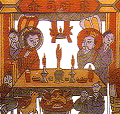
Unfortunately, he was a real prodigal and couldn't change his habit. He became a beggar after spending all his wife’s money. Finally, he woke up and was very regret and very sorry for his wife. But he couldn't do anything.
One day he begged for food on the front of his ex-wife’s house. His ex-wife recognized him and brought him into kitchen for better food. Meanwhile, his ex-wife’s husband came back into kitchen. Mr. Chang hided in the stove very quickly and quietly. But the husband put the fire into the stove to prepare hot water for bath. Mr. Chang kept inside and didn’t make a sound to protect his ex-wife reputation. Certainly he was burnt to die.
Later, his ex-wife prayed for Mr. Chang over the kitchen stove every day. People asked her what she was doing. She always answered she worshiped the God of Stove. The name of God of Stove was spread from there.
